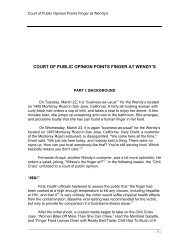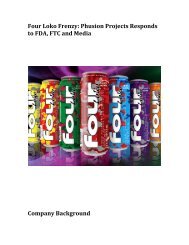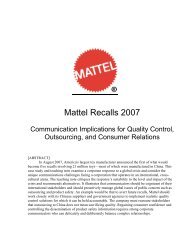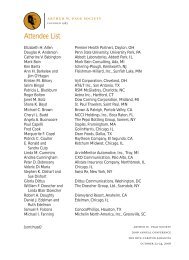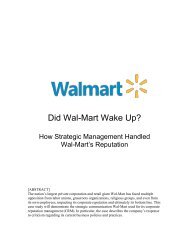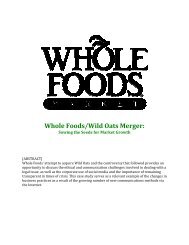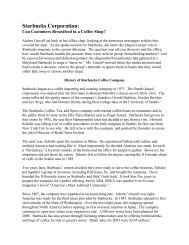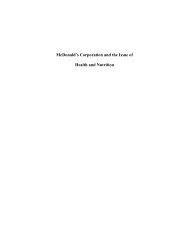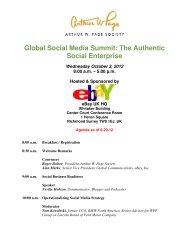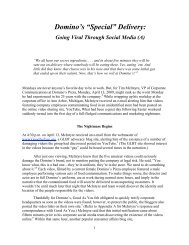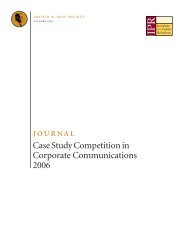Subaru Case Study - The Arthur Page Society
Subaru Case Study - The Arthur Page Society
Subaru Case Study - The Arthur Page Society
Create successful ePaper yourself
Turn your PDF publications into a flip-book with our unique Google optimized e-Paper software.
FOUNDING SPONSOR OF SIRIUS OUTQ AND LOGO<br />
Keeping with the standard set by the Rainbow Card, <strong>Subaru</strong> signed on as a founding<br />
sponsor of Sirius Satellite Radio’s OutQ in 2004, a channel devoted to gay and lesbian content.<br />
<strong>The</strong> partnership included traditional advertising messages, event sponsorship, and on-air<br />
endorsements by host John McMullen, who was given a 2005 <strong>Subaru</strong> Outback XT. Referencing<br />
Howard Stern’s previous partnership with Snapple in stating that radio endorsements are not<br />
new, McMullen mentioned his initial hesitation regarding product endorsement, for the sake of<br />
authenticity: “I took the time to actually go out there and rent one so I didn’t get us into a deal I<br />
didn’t believe in.” 159<br />
One year after signing on as the founding sponsor of Sirius’ OutQ, <strong>Subaru</strong> joined Orbitz<br />
and Paramount Pictures as one of three founding sponsors of MTV Network’s new cable<br />
channel, Logo. 160 Nash, Creative Director of Moon City Productions, offered insight into the<br />
sponsorship by stating that, “Category clutter is something this brand avoids at all costs. Logo<br />
presented a way to recapture the lead we had 10 years ago.” 161<br />
Initially, <strong>Subaru</strong> ran mainstream ads on Logo that were created by then-agency DDB<br />
Worldwide. 162 But true to form, the company introduced three brand new gay- and lesbianspecific<br />
commercials in October 2005, a few months after Logo’s launch, along with<br />
corresponding print ads in <strong>The</strong> Advocate and Out and an online contest. 163 By November 2005,<br />
<strong>Subaru</strong> was discussing future plans for more commercials, despite the fact that the channel was<br />
not yet Nielsen-rated. 164<br />
In addition to the standard :15, :30, and :60 second television spots, Logo also presented<br />
advertisers with a new form of communication – interstitials. Interstitials run for the duration of a<br />
commercial break and are sponsored by one company. <strong>Subaru</strong> and MTV Networks co-created<br />
two-minute interstitials featuring stories of real-life gay men and lesbians; <strong>Subaru</strong> branding was<br />
flashed at the end only. 165 As Hank Close, President for MTV Networks’ Ad Sales explained,<br />
“<strong>The</strong> whole goal here is to blur the line between content and advertising message.” 166<br />
In October 2009, <strong>Subaru</strong> launched the Logo Legacy Campaign, a six-month branding<br />
campaign extending interstitials to three minutes. <strong>The</strong> campaign is a play on words, referencing<br />
<strong>Subaru</strong>’s launch of the 2010 Legacy model and the legacy of gay and lesbian entertainers. <strong>The</strong><br />
interstitials once again feature real-life gay men and lesbians discussing their lives, with <strong>Subaru</strong><br />
branding appearing at the beginning only. Viewers are guided to LogoOnline.com for more<br />
information about <strong>Subaru</strong>’s products as well as a showcase of <strong>Subaru</strong>’s previous gay and lesbian<br />
ads. Lisa Sherman, Senior VP and General Manager of Logo proclaimed, “We are proud to<br />
partner with <strong>Subaru</strong>, a company that has truly raised the bar with the work they have done with<br />
and for the community to offer this meaningful campaign to our viewers.” 167<br />
GAY ORGANIZATIONS RECOGNIZE SUBARU’S EFFORTS<br />
Gay organizations began formally recognizing <strong>Subaru</strong>’s efforts in 2002, starting with the<br />
Human Rights Campaign (HRC). HRC, the United States’ largest gay and lesbian advocacy<br />
organization, ranks the employment policies of public and private companies nationwide in its<br />
annual Corporate Equality Index (CEI). <strong>The</strong> HRC bases its rankings on the existence of non-<br />
<br />
19



